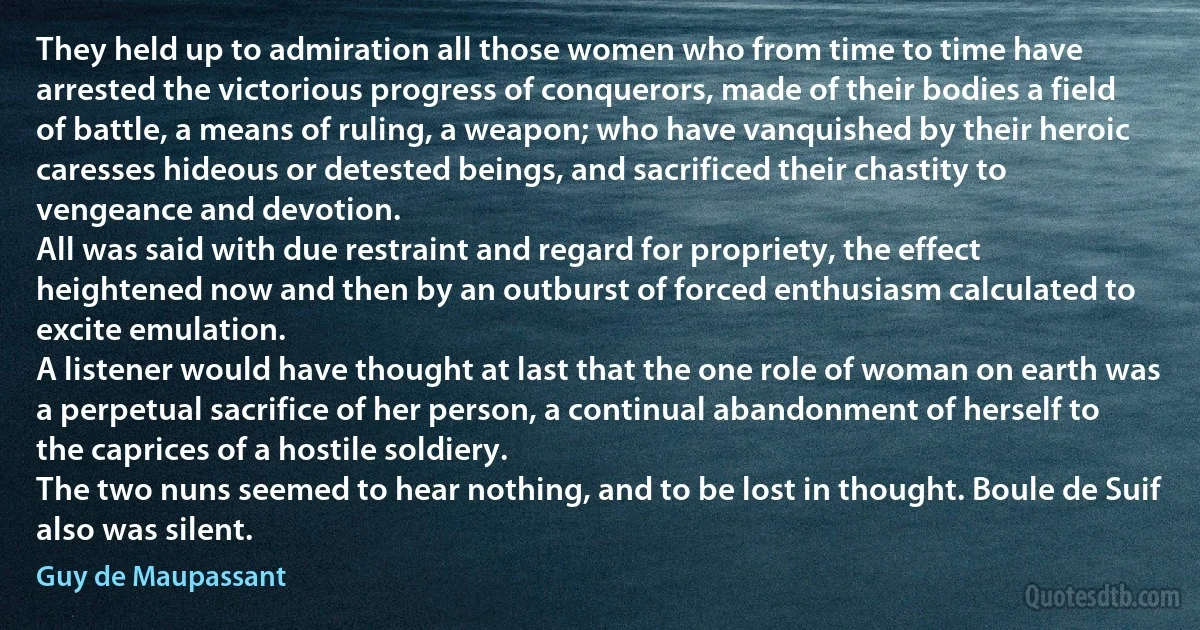Perpetual Quotes - page 10
His name was Jermyn, and he dodged all day long about the galley drying his handkerchief before the stove. Apparently he never slept. He was a dismal man, with a perpetual tear sparkling at the end of his nose, who either had been in trouble, or was in trouble, or expected to be in trouble - couldn't be happy unless something went wrong. He mistrusted my youth, my common-sense, and my seamanship, and made a point of showing it in a hundred little ways. I dare say he was right. It seems to me I knew very little then, and I know not much more now; but I cherish a hate for that Jermyn to this day.

Joseph Conrad
[B]ecause that which is finite is always bounded with reference to something... it is necessary that there should be no end... [N]umber also appears to be infinite, and mathematical magnitudes, and that which is beyond the heavens. And since that which is beyond is infinite, body also appears to be infinite, and it would seem that there are infinite worlds; for why is there rather void here than there? ...If also there is a vacuum, and an infinite place, it is necessary that there should be an infinite body: for in things which have a perpetual subsistence, capacity differs nothing from being. The speculation of the infinite is, however, attended with doubt: for many impossibilities happen both to those who do not admit that it has a subsistence, and to those who do. ...It is ...especially the province of a natural philosopher to consider if there be a sensible infinite magnitude.

Aristotle
It was pleasant to me to get a letter from you the other day. Perhaps I should have found it pleasanter if I had been able to decipher it. I don't think that I mastered anything beyond the date (which I knew) and the signature (which I guessed at).
There's a singular and a perpetual charm in a letter of yours; it never grows old, it never loses its novelty... Other letters are read and thrown away and forgotten, but yours are kept forever - unread. One of them will last a reasonable man a lifetime.

Thomas Bailey Aldrich
When we soar up above ourselves, And become, in our upward striving towards God, So simple, that the naked Love in the Heights can lay hold on us, There where Love cherishes Love, above all activity and all virtue (That is to say, in our Origin, wherefrom we are spiritually born)- Then we cease, and we and all that is our own die into God. And in this death we become hidden Sons of God, and find in ourselves a new life, And that is Eternal Life. And of these Sons, St. Paul says: ‘Ye are dead, and your life is hid with Christ in God.' In our approach to God we must bear with us ourselves and all that we do, As a perpetual sacrifice to God; And in the Presence of God we must leave ourselves and all our works, And, dying in love, soar up above all created things into the Superessential Kingdom of God.
And of this the Spirit of God speaks in the Book of Hidden Things, saying: ‘Blessed are the dead that die in the Lord.

John Ruysbroeck
The third of this kind of principles is : matter neither originates nor perishes; all the changes in the world concern form only; a postulate which on the recommendation of common sense has spread through all philosophical schools, not because it is to be taken as having been found so, or as having been demonstrated by arguments a priori, but because if we were to admit that matter itself is fleeting and transitory, nothing at all that is stable and lasting would be left any longer to serve for the explication of phenomena according to universal and perpetual laws, and hence nothing at all would be left for the exercise of the intellect.

Immanuel Kant
It has been the persuasion of an immense majority of human beings in all ages and nations that we continue to live after death,-that apparent termination of all the functions of sensitive and intellectual existence. Nor has mankind been contented with supposing that species of existence which some philosophers have asserted; namely, the resolution of the component parts of the mechanism of a living being into its elements, and the impossibility of the minutest particle of these sustaining the smallest diminution. They have clung to the idea that sensibility and thought, which they have distinguished from the objects of it, under the several names of spirit and matter, is, in its own nature, less susceptible of division and decay, and that, when the body is resolved into its elements, the principle which animated it will remain perpetual and unchanged.

Percy Bysshe Shelley
And so, supposing that light impinging on a refracting or reflecting ethereal superficies puts it into a vibrating motion, that physical superficies being by the perpetual applause of rays always kept in a vibrating motion, and the ether therein continually expanded and compressed by turns, if a ray of light impinge on it when it is much compressed, I suppose it is then too dense and stiff to let the ray through, and so reflects it; but the rays that impinge on it at other times, when it is either expanded by the interval between two vibrations or not too much compressed and condensed, go through and are refracted.

Isaac Newton
It is always easier to believe than to deny. Our minds are naturally affirmative; it is not till the second or third thought that doubt begins. Belief is so vital and necessary that one would say the tendency was made strong at the perpetual risk of extra belief and superstition; it were better to believe too much than not enough. Hence mankind have always believed too much, as if to make sure that the anchor hold. To believe just enough, to free his mind from all cant and from all illusion, and see things just as in themselves they are, is the aim of the philosopher or of the true skeptic.

John Burroughs
Charm is the ultimate weapon, the supreme seduction, against which there are few defences. If you've got it, you need almost nothing else, neither money, looks, nor pedigree. It's a gift, only to be given away, and the more used the more there is. It is also a climate of behaviour set for the perpetual summer and thermostatically controlled by taste and tact.

Laurie Lee
News of the atrocities, which have recently been perpetrated by the Turkish king in Constantinople and have now been divulged, has so inflamed a man [Cusa himself] who once saw that region, with zeal for God, that amongst many sighs he asked the Creator of all things if in His kindness He might moderate the persecution, which raged more than usual on account of diverse religious rites. Then it occurred that after several days-indeed on account of lengthy, continuous meditation-a vision was manifested to the zealous man, from which he concluded that it would be possible, through the experience of a few wise men who are well acquainted with all the diverse practices which are observed in religions across the world, to find a unique and propitious concordance, and through this to constitute a perpetual peace in religion upon the appropriate and true course.

Nicholas of Cusa
We will ultimately live in a perpetual data-driven talent edition. Everything you create will be measured and tracked by others through comments, share, and likes. Your work will come up on the radar of potential employers and clients, and the data will tell them if you are worth talking to or hiring.

Scott Belsky
Growing up under the heavy hand of the School Sisters of Notre Dame, it was drummed into me that attending weekly mass was not an option. It was a must to avoid eternal damnation, which was not a prospect filled with many positives. Hell fire was perpetual, and no parole would be offered.

Bill O'Reilly



